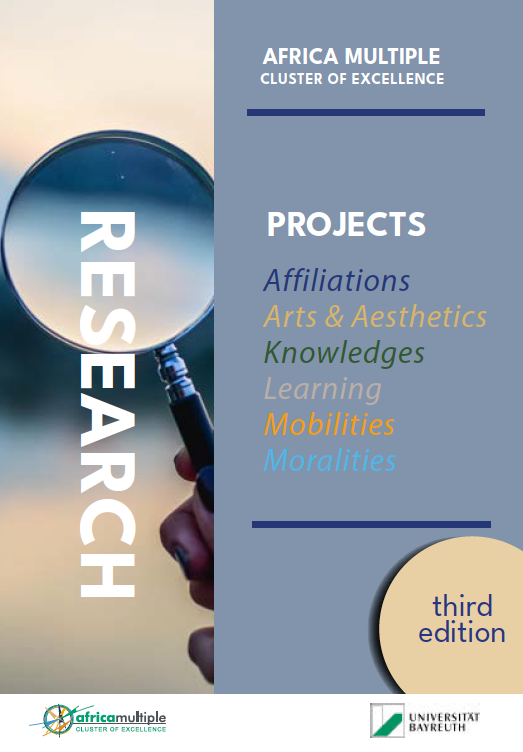African Knowledges and the History Publication since the 1970s

Cassandra Mark-Thiesen
“Heightened turmoil in the realm of global knowledge production has recently stimulated questions leading to research on inequalities and relationalities within the university; between universities in the “Global South” and “Global North”; as well as between experts and non-experts in a given society. The Junior Research Group “African Knowledges and the History Publication since the 1970s” suggests that the discipline of (African) History, with its sustained contestations over who qualifies as the ideal narrator of the past; what qualifies as a “proper” primary source; the conceptualisation time; and the politics of the archive, to name some examples, presents a particularly rich foundation for exploring this landscape.
How power enters the production of history is a critical but underexplored topic in the field. In his book Silencing the Past Michel-Rolph Trouillot locates fours crucial points when this occurs: 1) “the making of sources”; 2) “the making of archives”; 3) “the making of narratives”; and, 4) “the making of history in the final instance”. Furthermore, the book deals “with the many ways in which the production of historical narratives involves the uneven contribution of competing groups and individuals who have unequal access to the means for such productions” (xxiii). Using a media-centred approach, we want to explore interrelations between producers of history in public, popular and academic spheres on the continent. How do their works interact (or not)? What particular lessons can be drawn about the medialities of specific forms of expression, whether material or immaterial? What implications do these insights have for the future of the discipline?
We want to contribute to debates on Africa-centred knowledge(s); touchpoints between memory (incl. forgetting and recalling of events) and history; the “work” history does in the public sphere; co-production between community members and the academy; North-South collaborations; digital humanities for Africa; “postcolonial” African archives; peace & the preservation of the past.
Amongst other things, we propose that in order to capture local practices of historical knowledge transmission, it is necessary to move beyond the printed word to analyse other forms of media, whether audio or visual. It is in this rich multiplicity of intellectual expression that Africa-based African Studies serves as a potential model for how to “reconfigure African Studies” (globally).

Luisa Schneider
We deploy a range of approaches:
Cassandra Mark-Thiesen scrutinises the practices of African and Africa-based knowledge production in African Studies, in particular as recorded in the journal of historical societies and history departments (in West-, East and southern Africa), the bulk of which emerged in the (1960s and)1970s. Digital humanities tools will be used to examine these works as a collective body of knowledge; exploring apparent trends across this corpus of Africa-based historical writings comprising of thousands of articles, as they concern citations, circulations of knowledge, scholarly aesthetics, the space given to history written by “amateurs”, etc. A close reading approach will be used to discover notions of temporalities, publics, self-fashioning, professionalization, African unity, and postcolonial politics. The project investigates “visible” and “invisible” power in the production (and afterlives) of these journals.
Luisa Schneider’s project contributes to the scholarship on “returning” to Africa before and since the start of the transatlantic slave trade. In using “unorthodox” source material from internet forums to nature-based monuments, she pursues a grand narrative of transatlantic returning at the crossroads of historical “repatriations” and recent “Year of Return” festivals. In particular, she questions how this mobility has shaped public life in Africa. Her study seeks to contribute to the interdisciplinary scholarship of the legacy of slavery within African-based societies and in local public discourses.

Edidiong Charles Ibanga
Edidiong’s project focuses on the projections and mediations of womanhood in Liberian television programming of the 80s. Using the audio-visual archives of the Liberia Broadcasting System (LBS) as the primary data source, alongside in-depth interviews, oral history, and biographies/ life stories, she explores archival mediations, as well as collective memories and imaginaries, to uncover renditions and experiences of womanhood and femininity. Considering the archives as a space for multiple mediations and a continuous negotiation of identities and personhood, she asks how the media as a public space produces knowledge about women, what kind of knowledge is produced, and how women's experiences in Liberian media of the 80s reflect gendered relations in Liberian society.
The continent of Africa, already disadvantaged in the global constellation of power in the circulation of knowledge, also draws concern over its endangered and lost archival materials. Therefore, we will be collaborating with the Liberia Broadcasting System to preserve their video archive, covering the entire era of the 1980s, as part of the project.
Finally, the project seeks to develop new forms of collaboration by working closely with the Historical Society of Liberia“

Richard Anyah (†, in memoriam)
The project (2020-2022) by the late Richard Anyah assessed historical narrations and subjectivities as made visible in historical public television archives from Liberia. He asked what emotions and memories are sparked when material reflecting pre-war narrations of the past and historical subjectivities are reanimated in a postwar context via public and curated viewings.
- For more information, please click here.
- Please find an overview of the project here


